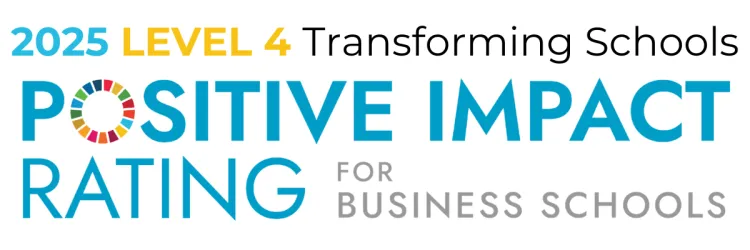The Grossman School of Business (GSB) at the University of Vermont (UVM) has been recognized for its meaningful societal contributions and strong commitment to sustainability in the sixth edition of the Positive Impact Rating (PIR), launched in June at the PIR Global Summit 2025 and acknowledged during the UN PRME Global Forum.
Grossman School was among 86 business schools from 30 countries participating in this year’s PIR, which recorded a record-breaking 17,167 student responses—a 13% increase from the previous year. GSB achieved Level 4, earning the distinction of a Transforming institution within the PIR framework. This level of recognition is reserved for those schools which demonstrate a positive impact culture, governance, and systems, with visible results in many impact dimensions.
“This recognition as a Transformative Institution speaks volumes about the impact that our programs have had over the years, and aligns with our other recognitions as an AACSB accredited school and a Beta Gamma Sigma Bronze Chapter winner, ” reflected Dr. Barb Arel, Associate Dean of Grossman School, “Our curriculum and calendar are packed with experiential learning opportunities and lectures from thought leaders across multiple business disciplines. Whether it is through our undergraduate concentrations, or our award-winning MBA program, we are proud to be graduating the business leaders of tomorrow – leaders who understand the critical importance of business innovations in sustaining a healthy global economy.”
Participation Across the Board
The PIR is a student-led initiative designed to reflect how students perceive their schools’ positive impact on society. In 2025, the PIR introduced a significant innovation: the Faculty Survey. The Grossman School of Business was among the institutions that implemented this new feature, enabling a comparative analysis between student and faculty perspectives and fostering a culture of shared learning and continuous improvement.
Students evaluated how GSB addresses pressing societal and environmental challenges and how effectively it prepares students to become responsible, ethical leaders. The school’s goal to collect 100 completed surveys was well surpassed this year, with 144 graduate and undergraduate students from the school participating in this year’s PIR survey.
How the PIR is Determined

The PIR framework comprises 20 questions grouped into seven dimensions across three core areas: Energizing, Educating, and Engaging. Based on these results, schools are placed into one of five levels, with Levels 3 (Progressing), 4 (Transforming), and 5 (Pioneering) publicly reported.
Professor Thomas Dyllick, PIR Founder and Member of the Supervisory Board, stated:
“While future students now have an alternative source to select their business school, schools refer to the PIR primarily to measure and communicate their transformational progress. The voice of the student has become a true source of value.”
The PIR was initiated by a coalition of business school experts and international NGOs, including WWF, Oxfam, and the UN Global Compact. It is supported by student organizations such as oikos, AIESEC, and Net Impact, and backed by institutions including VIVA Idea (Costa Rica), the Institute for Business Sustainability Foundation, and FehrAdvice (Switzerland).
New in 2025, the PIR also introduced enhanced reporting modules to support schools in meeting accreditation requirements for PRME, AACSB, and EQUIS. These modules enable institutions to use PIR data to report on Ethics, Responsibility, and Sustainability (ERS) standards with stakeholder-derived evidence.


